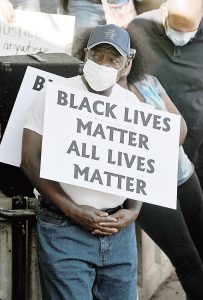NAACP leader fostered harmony
Witherspoon, 77, ‘made things better for a lot of people’
- Witherspoon
- 06/06/20 Mirror photo by Patrick Waksmunski / Blair County NAACP President Donald Witherspoon listens to speakers at the Put People First PA! March starting at Heritage Plaza on Saturday.

Witherspoon
Racial injustice — including this year’s killing of a Black man by police in Minneapolis — is often a trigger for anger, but a leading black figure in Blair County who died Saturday preferred calm discussion as he worked toward racial harmony.
Don Witherspoon was the president of the Blair County NAACP, and when he responded to discrimination and civil rights complaints on matters of employment or school sports, he would get both sides together and listen, attempting to resolve the problem by defusing it, rather than by putting the alleged perpetrator on the defensive, said Bill Sweet, his vice president, his longtime friend, and a white man.
“He could see both sides,” Sweet said. “It was because of his overall demeanor.”
Witherspoon, who died of COVID-19 at 77, was raised with his five siblings by a mother who was widowed young in a small black community in Claysburg, where the men mostly worked in the brickyard, and the women often worked in housekeeping, said Don’s brother, Jerry, who lives in New Jersey.
Their mother taught them that if they carried themselves “in a nice way,” people would help them when they needed it, Jerry said.

06/06/20 Mirror photo by Patrick Waksmunski / Blair County NAACP President Donald Witherspoon listens to speakers at the Put People First PA! March starting at Heritage Plaza on Saturday.
His brother put that lesson into practice all his life, according to Jerry.
There was little racial discrimination in Claysburg, Jerry said.
When the sports teams traveled to other schools, where sometimes there was heckling, the white players “protected” them, going into the stands to confront their antagonists, he said.
The bonds created on those teams have lasted a lifetime, he said.
The Witherspoons didn’t have many material things, but white schoolmates would invite them over to swim in their pools, something the Witherspoons didn’t realize then was unusual for that era, according to Jerry.
“I thought that was the way people were,” he said.
As the second-oldest in his family, Don learned early to be a leader, said his sister, Patricia Witherspoon-Curry.
He would collect cans in the neighborhood and sell them, she said, then keep the money in a sock, and when their mother needed something, he’d get the sock and give her what was necessary.
He was likable to people “from all walks of life,” said Witherspoon-Curry.
He was “cordial, friendly, gentlemanly” — and witty, said Jacqueline Smith-Bennett, a longtime friend.
His presence wasn’t overbearing, but you always knew when he entered a room, Smith-Bennett said.
“He made you gravitate to him,” she said.
He also became friends with people in high places, with the help of lessons learned in childhood.
After the NAACP reached out to the Black community in Blair County in the early 1980s for someone to lead the local chapter, and he won the job, he became the go-to person when injustice arose, said Smith-Bennett.
“Whenever there was an incident that involved race relations, he was the key person,” Smith-Bennett said. “Everybody looked to Don.”
It became a stock phrase: “Call ‘Spoon,” she said.
And he would always show up, she said.
The Black community in this area is small, so it was reassuring to have someone like him to rely on, according to Smith-Bennett.
He wasn’t an attorney, but he “knew a lot of people of influence and (commanded) a lot of respect,” Smith-Bennett said.
“He knew governors, mayors, policemen,” Jerry said. “The big wheels.”
He would ask rhetorically, “‘Who do people think I am?’ and then he would go ahead and do exactly what they asked,” Smith-Bennett said.
Along with Alice Lawrence, he became a “watchdog” for the rights of Black prison inmates, Smith-Bennett said.
His interventions “made things better for a lot of people in a lot of situations,” Smith-Bennett said.
The early bonds created by athletics helped, she said.
So did his “laid-back, easy, smooth way,” coupled with his habit of delaying responses in conversation — pondering his answers — a habit that could be “comical” and that was “part of his charm,” she said.
“He was not pretentious, (but) he loved being himself,” she said. “People enjoyed him.”
His reach extended beyond Blair County, with the help of his relationship with one of the area’s more influential people, Bob Jubelirer, longtime state senator and for a time, president pro-tem of the state Senate.
At Witherspoon’s urging, Jubelirer became prime sponsor of a bill that, with the help of then-Gov. Tom Ridge and then-Attorney General and later governor Tom Corbett, made it a criminal trespass violation to burn a cross on someone else’s property.
“At the time, there were a lot of cross burnings that we couldn’t prosecute,” Jubelirer said. “Don was the moving force behind (the change).”
Witherspoon “spoke for his community and our community and made us feel we were all a part,” Jubelirer stated.
He focused not on others’ flaws, but on their successes, said Charles Dupree, a cousin raised as Witherspoon’s “little brother.”
“He worked with everybody,” said his wife, Linda, with whom he was together for 52 years. “He didn’t think of problems in black and white.”





